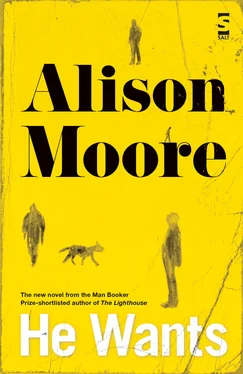Alison Moore - He Wants
Здесь есть возможность читать онлайн «Alison Moore - He Wants» весь текст электронной книги совершенно бесплатно (целиком полную версию без сокращений). В некоторых случаях можно слушать аудио, скачать через торрент в формате fb2 и присутствует краткое содержание. Год выпуска: 2014, Издательство: Salt Publishing Limited, Жанр: Современная проза, на английском языке. Описание произведения, (предисловие) а так же отзывы посетителей доступны на портале библиотеки ЛибКат.
- Название:He Wants
- Автор:
- Издательство:Salt Publishing Limited
- Жанр:
- Год:2014
- ISBN:нет данных
- Рейтинг книги:5 / 5. Голосов: 1
-
Избранное:Добавить в избранное
- Отзывы:
-
Ваша оценка:
- 100
- 1
- 2
- 3
- 4
- 5
He Wants: краткое содержание, описание и аннотация
Предлагаем к чтению аннотацию, описание, краткое содержание или предисловие (зависит от того, что написал сам автор книги «He Wants»). Если вы не нашли необходимую информацию о книге — напишите в комментариях, мы постараемся отыскать её.
When an old friend appears on the scene, Lewis finds his routine and comfortable life shaken up.
He Wants — читать онлайн бесплатно полную книгу (весь текст) целиком
Ниже представлен текст книги, разбитый по страницам. Система сохранения места последней прочитанной страницы, позволяет с удобством читать онлайн бесплатно книгу «He Wants», без необходимости каждый раз заново искать на чём Вы остановились. Поставьте закладку, и сможете в любой момент перейти на страницу, на которой закончили чтение.
Интервал:
Закладка:
After shutting down the computer, Lewis sits for a while looking around Ruth’s room. Her shelves are empty of the classics that belong there, the stories he read as a boy, stories in which you can walk through a mirror or through the back of a wardrobe or climb to the top of a tree and find an unlikely and magical land. He used to try it, half closing his eyes and stepping forward, walking so hopefully, with such desire, into his mirror, into the back of his wardrobe. He could never get in. He read these stories to Ruth when she was little, and he supposes she has taken them to read to her boy. In the children’s television programmes she used to watch, a man passed through a changing room door into another world; and a boy, put to bed by his mother, used his torch to open up a portal in his bedroom floor, sliding with his dog down a helter-skelter into Cuckoo Land.
She has left the posters. Where Ruth lives now, she has magnolia walls hung with monochrome studio portraits of her family. These men in their unbuttoned lumberjack shirts, these men with whom she was briefly in love when she was young, grin down at Lewis now.
A dreamcatcher dangles from the ceiling.
He looks at his watch, and at the same time removes it from his wrist. It aggravates the skin where his arm got burned and increasingly he finds himself leaving it off.
It is almost opening time. Not much more than a year ago, he might have been going to The Golden Fleece now, but not any longer. These days he goes to another pub in the opposite direction. It is not as popular with the locals but Miranda is friendly. He thinks that he would like to be able to say to Ruth, when she comes round in the morning, that he did go out of the house, and not just to the bin.
Leaving his watch next to the computer, he gets up out of the uncomfortable chair and heads downstairs.
6. He does not want the sausages
AT THE BOTTOM of the stairs, Lewis stops to take his coat down from the peg. The buttons are coming off — they are hanging by threads, and one is missing altogether. His gloves are in the pockets. Holding on to the banister, he lowers himself onto the second stair, where he takes off his slippers and puts on his outdoor shoes. Standing again, he pauses to check that he has his key and to put on his hat, and then he heads outside, stopping to slam the door behind him. He sometimes has to slam it three times before it closes properly. If he does not, he might come home and find his door standing wide open.
He goes carefully down the front steps and onto the path of concrete slabs. He laid the slabs himself when he and Edie first came to this house, along with the garden walls at the front and back. Eyeing the grass on either side, passing the stone lion at the gate, he looks up the road. A hundred yards away are the public toilets. A sign on the wall of the toilet block says, ‘THESE FACILITIES ARE FOR ALL TO USE’, and, beneath a picture of a family of four rounded stick people, ‘IS YOUR CONDUCT APPROPRIATE?’ Beyond the toilets is The Golden Fleece. He turns in the opposite direction and wanders down the road towards the other pub. He goes slowly, scanning the pavement for his missing button.
Everything is quiet. There is a spit of rain in the air. It reminds him of the seaside, the salt spray when the tide comes in and the sea pounds against the wall as if it cannot accept that this is as far as it goes.
His grandparents lived on the coast. They had a beach hut until it was lost in a storm. Lewis had imagined a whirlwind lifting it neatly out of the row, whisking it intact into the sky, like the little wooden house in The Wizard of Oz .
He always imagined living by the sea, perhaps in his retirement. But he is now seventy years old, retired years ago, and is still living in this village in the Midlands, less than a mile from the house in which he grew up and around the corner from the school in which he has spent the best part of his life.
His parents’ house on Small Street is gone now, knocked down to build the supermarket car park, which has signs around the perimeter that say, ‘Motorists! Your car is at risk from thieves’ and, ‘Leave it on show expect it to go’. The pub is half a mile ahead, but Lewis turns right, towards the school. When he reaches the school railings, he stops, gazing into the deserted playground. When the double doors open, he flinches in anticipation of the headmistress striding out, coming towards him. His instinct is to run, as if he were not a grown-up, a previous employee of this establishment, but a truant, a runaway, an absentee who might be dragged by the ear to the headmistress’s office. It is not the headmistress, though; it is a boy, going from one building to another, perhaps with a message for a teacher or a wound for the school nurse. Lewis thinks for a moment that it is a boy he knows, but then he realises that it is not, that it can’t be, because all the children he knew will have gone by now.
Lewis turns away, walking on in the direction of the pub. Passing a bus shelter, he thinks about Ruth and her saying to him, ‘You can travel for free all over the country — what are you waiting for?’ He could go to the seaside; he could go all the way to Dover. He will do it, he thinks, one of these days. Not right now. He would want to wait for warmer weather. He would need to apply for a bus pass. He would have to go into town to get a passport photo taken.
You are not allowed to smile in your photo any more.
He stops to watch a yellow car go by, turning to meet the gaze of the dog that is staring at him through the rear window, its mouth open and fixed in a smile. The car, a Saab, stops at the pedestrian crossing a little further along the road, letting across a woman with hair that is grey at the roots and dyed red at the ends. Lewis starts walking back towards it, but the yellow car is already moving again. Turning the corner, it goes out of sight.
Lewis is still gazing at that empty corner when he realises that the woman for whom the car stopped, the woman who crossed the road, is now very near. She comes, in her dogtooth coat, to a stop just in front of him. Lewis is lifting the hat off his head when the woman raises her hand and strikes him sufficiently hard that his spectacles fly off his face. He is still holding his hat in the air; his mouth is still slightly open, ready to speak. He saw, before he lost his spectacles, the scarring on her face, the damage to her skin. She starts shouting, jabbing at his chest with her index finger, and he realises who she is, and he, apologising, replaces his hat and reaches down to the ground for his spectacles. While the woman is standing there telling him off, Lewis returns his spectacles to his face but finds that the lenses are smashed and takes them off again. He puts them in his pocket and walks away as quickly as his poorly knee will allow.
Just outside the pub, he sees what he thinks for a moment might be his button lying on the ground, but then he remembers that it is a pound coin; it has been there for months. The first time he saw it, he stopped to reach down and pick it up and found that it was glued to the pavement. He remembers his confusion, his scrabbling fingertips. He remembers when Ruth’s boy was a baby and would try to get hold of things that could not be grasped, that could not be picked up — a biscuit pictured on the lid of a tin, a dot of light on the living room carpet. Lewis, scratching at the pavement, had to straighten up again and walk on without it.
The pub always looks closed from the outside, but when he pushes open the heavy door there is light and sound and Miranda smiling at him as the door settles behind him. The interior reminds him of somebody’s living room. The wallpaper shows quaint farming scenes, a man with a scythe surveying his land, the pattern repeating around the four walls. There is a busy carpet, a threadbare sofa, sport on a small television in the corner and a handful of classic board games on a table underneath. There are floral curtains, vases of plastic daffodils on the windowsills, ornaments on the mantelpiece above the fireplace in which logs are arranged as if ready to be lit, although they never are. There are shelves containing ancient hardback books that no one reads: Todhunter’s Differential Calculus , three volumes of Harmsworth’s Home Doctor: BRU — DUC, DUL — JEA and POW — SYS , and Carter’s Outlines of History in which history stops in 1918. Lewis wonders if there are later editions in which history instead comes to an end in 1945 or 1961 or 2013. There are two copies of Les Misérables and faded children’s classics, a beautiful old edition of a little book of nursery rhymes that he had when he was a boy. Topsy-turvy, upside down, the sea is on the moon. He doesn’t know where his copy has gone. Sydney would just take this one.
Читать дальшеИнтервал:
Закладка:
Похожие книги на «He Wants»
Представляем Вашему вниманию похожие книги на «He Wants» списком для выбора. Мы отобрали схожую по названию и смыслу литературу в надежде предоставить читателям больше вариантов отыскать новые, интересные, ещё непрочитанные произведения.
Обсуждение, отзывы о книге «He Wants» и просто собственные мнения читателей. Оставьте ваши комментарии, напишите, что Вы думаете о произведении, его смысле или главных героях. Укажите что конкретно понравилось, а что нет, и почему Вы так считаете.












